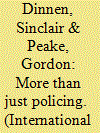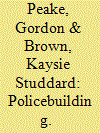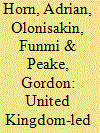|
|
|
Sort Order |
|
|
|
Items / Page
|
|
|
|
|
|
|
| Srl | Item |
| 1 |
ID:
127067


|
|
|
|
|
| Publication |
2013.
|
| Summary/Abstract |
Against the generally disappointing outcomes of international police reform in fragile settings, this article examines a New Zealand-supported community policing programme in post-conflict Bougainville. While the programme's engagement with the regular police organization has struggled for traction, support provided to an innovative and socially embedded policing initiative has produced promising results. The reasons behind these divergent outcomes and their implications for international policing are explored in the context of Bougainville's recent history, including the legacies of conflict and the new vision of hybrid policing in the post-conflict political settlement.
|
|
|
|
|
|
|
|
|
|
|
|
|
|
|
|
| 2 |
ID:
107840


|
|
|
|
|
| Publication |
2011.
|
| Summary/Abstract |
Although the concept of partnership offers little substantively new to the theory and practice of peace operations, it provides a useful political frame to advance reform efforts in UN policing. In the last few years, several improvements have been made in doctrine, training and increasing the pace of deployment. However, the case of Timor-Leste suggests that these efforts have not resulted in obvious improvements in the abilities of the UN Police (UNPOL) to carry out their mandated functions. Solutions offered by the New Horizon agenda are technical and do not address the political dimensions of the problems encountered in field missions. In Timor-Leste, the host government is not interested in engaging in a partnership with UNPOL. Problems with international policing may be so deep, complex and subject to politics that even substantial process-oriented solutions will not achieve significant results.
|
|
|
|
|
|
|
|
|
|
|
|
|
|
|
|
| 3 |
ID:
069896


|
|
|
|
|
| Publication |
2005.
|
| Summary/Abstract |
Increasingly, significant numbers of personnel are deployed in field missions either to serve as police officers or to assist in reforming national police capacity. Reforming and building a police system - in this article termed 'policebuilding' - is exceedingly difficult, demanding the condensing of diverse training skills in a very short period and fast-forwarding the development of skills that are ideally built up over generations. This article examines the Australian initiative of 2004 that broke with the makeshift pattern of international police reform by forming an International Police Deployment Group (IDG). It assesses the deployment to the Solomon Islands in order to draw out lessons for future instances in which IDG officers may be called upon. The IDG appears to offer an apt structure, depth of planning, continuity of staffing and steadiness of resourcing that past missions have lacked. Yet, while relative calm and basic levels of law and order have been restored to the Solomon Islands, transferring authority and successfully supporting local police reform has proven to be more difficult.
|
|
|
|
|
|
|
|
|
|
|
|
|
|
|
|
| 4 |
ID:
075017


|
|
|
|
|
| Publication |
2006.
|
| Summary/Abstract |
Australia is engaged in a range of police-building exercises with its regional neighbours. The character of this assistance has changed across time and space reflecting, among other things, the development of new approaches to police-building in weak and post-conflict states. This article examines three such approaches adopted in Papua New Guinea and Solomon Islands, respectively. Both countries comprise challenging development contexts marked by high levels of social diversity and topographical fragmentation, weak centralised states, resilient and largely self-regulating village-based societies, and police forces with limited reach, resources, and popular legitimacy. Among other things, the review of Australian police-building experience in the Pacific Islands indicates the need to engage more effectively with non-state actors and organizations in building appropriate and sustainable policing systems in such fragile national environments.
|
|
|
|
|
|
|
|
|
|
|
|
|
|
|
|
| 5 |
ID:
075018


|
|
|
|
|
| Publication |
2006.
|
| Summary/Abstract |
The UK's work in reforming security institutions in Sierra Leone is widely held as representing an example of successful SSR. Basic capacity and public trust has been restored in politicized and debilitated police and military institutions. It provided much needed confidence to people who no longer had faith in their own security institutions, and it created the stable, secure environment in which SSR could take place. This article offers the personal impressions and reflections of individuals actively involved in police and military reform. Three themes and policy dilemmas emerge from Sierra Leone's experience: the disconnection between policy and practice in the process; the difficulty of managing a process of comprehensive reform; and the question of sustainablity.
|
|
|
|
|
|
|
|
|
|
|
|
|
|
|
|
|
|
|
|
|